#plain language
Explore tagged Tumblr posts
Text

Book source: Calculus Made Easy by Silvanus P. Thompson
#calculus#plain language#plain words#simple words#laymans terms#thompson#silvanus thompson#math#mathematics#analogies#analogy
851 notes
·
View notes
Text
We see accessibility in too narrow a way. We see it as getting access to places. We tend not to think about it as getting access to information. A convoluted sentence with words like 'convoluted' in them can be just as much a barrier as an uncut curb. So, now, we are at the stage of making sure that information is presented in an accessible manner, like we are ramping language.
Dave Hingsburger: "Plain can be Beautiful," Of Battered Aspect. 15 January, 2015.
Confession: I grew up with the story of how, as a toddler, I was almost misdiagnosed as Intellectually Disabled* because of my cerebral palsy, and how that almost condemned me to a life in an institution.
I was therefore bigoted against the intellectually disabled for much of my life (though if you asked me at the time, I would have denied it), because in the back of my mind, accepting those people into my cohort felt like a threat.
This paragraph, and that analogy, snapped me out of it. If I am fully human, even if I need tools like an elevator to get to the second floor, than an intellectually disabled person is also clearly fully human, even if they need tools to navigate complex ideas.
57 notes
·
View notes
Text
a couple years ago on tumblr ii reblogged a post that linked to a blog that made plain language and easy read guides on topics like bigotry, police brutality, antifascism, and more. i can't find the post now. does anyone know what i'm talking about and have a link? thank you so much
32 notes
·
View notes
Text
The Autistic Self-Advocacy Network just dropped a series of plain-language videos on the Americans with Disabilities Act.
youtube
16 notes
·
View notes
Text
working on a plain language version of those Tone Indicator Guides
2 notes
·
View notes
Text
Why Plain Language Matters
In today's world, I feel like people want to find information quickly and easily. Everyone has questions, important assignments to complete, and information they need to know. However, it can be tough to find accessible, effective information if the content is filled with sentences that are hard to understand or phrases that aren't easily recognizable. That's where plain language comes in, as I believe it's the most important factor to consider when creating effective web content.
Sarah Horton and Whitney Quesenbery, in A Web for Everyone: Designing Accessible User Experiences, emphasize in Chapter 8: "Plain Language: Creates a Conversation," plain language is about making sure people can find, understand, and use information effectively. They define it as a behavioral measure, asking: "Can the people who are the audience for the material quickly and easily find what they need? Understand what they find? Act appropriately on that understanding?"
Horton and Quesenbery also point out that "people are in a hurry, get distracted, or miss a critical word in a paragraph." This reminds me that everyone accesses content differently, and it won't be the same experience for every user. That's why I think plain language can benefit everyone because, as Horton and Quesenbery emphasize, different audiences share similar needs when it comes to usability. Whether it's teens with short attention spans or adults who are "cautious clickers," I think everyone can benefit from more straightforward writing because it's clearer to understand.
0 notes
Text
Language and accessibility on tumblr
Before we talk about language, it is important to recognize that accessibility is not universal, and competing needs are part of disabled life. Competing needs is when the thing that makes something accessible for one person, also makes it inaccessible for another. With language, we can try to manage this by having multiple formats. This may include plain language translations, large typeset versions, images and/or image descriptions, or audio recordings of the text. These are just a few examples. However, including multiple formats takes time and effort. This can also be a barrier for disabled people. Sometimes other people can help, but sometimes we can’t avoid these competing needs. All we can do is try our best, and give each other understanding when we have to compromise.
I will try to write this post in as plain language as I can. In Kelsie Acton’s chapter ‘Plain Language for Disability Culture’1, she writes in what she calls ‘semi-plain language style’. She defines this as:
Use an active voice
Mostly use the 6000 most common words in the English language
Use short sentences
Use 14 point font
Use “I” and “you”
Plain language is important, because it makes ideas easy and clear to understand for the most people.
I do not have a lot of experience writing in plain language. I have ADHD. Part of having ADHD for me (and others like me 2) means my writing uses a lot of long sentences, brackets, and dashes, because that is how I think. Writing in plain language requires me to slow down and be intentional about what I say and how I say it. Many disabled authors have written about how we can use language to challenge ideas about time, speed, and efficiency(1). Writing in the way that is natural to me challenges the idea that narratives should be linear and efficient. For me, writing in plain language challenges the idea that adding more information will make an idea clearer. Both these ways of communicating are valid and important for accessibility. Both are necessary for understanding the world as disabled people do.
It is not always necessary to use complicated language to discuss complicated ideas. We can all try to accommodate each other.
On tumblr, writing in plain language is not common. Some people write with ‘correct’ grammar and punctuation. Many people write using punctuation rarely, or only for effect. This is sometimes referred to as ‘tumblr vernacular’. This can be difficult for some people to follow, especially if they are not familiar with it. However, it also removes barriers for some people who struggle with strict punctuation and grammar rules. It can also give people more flexibility in how they express their thoughts (like me), and makes it easier to include tone indicators (Examples: 3, 4).
Writing conventions on tumblr are flexible. People can use the way works best for them, or for the content they are posting. We can't always be accessible to everyone at the same time, but having flexibility helps.
1: Plain Language for Disability Culture (Kelsie Acton in Crip Authorship, 2023) https://library.oapen.org/handle/20.500.12657/89491
2: Learning Disability Justice through Critical Participatory Action Research (Laura J. Wernickin in Crip Authorship, 2023) https://library.oapen.org/handle/20.500.12657/89491
3: https://www.tumblr.com/hunterofhestia/770103242897096704/the-amount-of-times-people-have-gotten-mad-at-me?source=share
4: https://www.tumblr.com/chronicpaingirlie/732639202587574272/shaking-myself-very-gently-being-in-pain-takes?source=share
1 note
·
View note
Text
it is frustrating to see everyone share wonderful important ideas in unnecessarily complex and coded language. I beg of you, please embrace plain language.
What is plain language? It is is writing designed to ensure the reader understands as quickly, easily, and completely as possible.
Tips for Embracing Plain Language
Speaking simply. Keep it short and sweet and to the point. Reduce word count, reduce your use of niche vocabulary, and format your text in easy to digest paragraphs.
Speaking directly. Say what you mean. Avoid metaphors or complicated comparisons. Focus on crafting a singular impactful message.
Speak honestly. Tell the truth. Don't try to hide what you mean or trick people into discovering your real message after already having read half your text. Be transparent about what you mean and why you're speaking.
Speak kindly. Be nice! Avoid making direct demands of your audience or talking down to them. Consider where the use of words like "obviously" might be talking down to the reader.
This isn't everything, but it's what I think would help anyone get started making more accessible language.
You might think or feel like you are "dumbing it down" but what you're actually doing is making it accessible. This isn't just a nice moral thing to do, but it is a smart tactic to meet your goals like audience engagement or reader retention.
Also, niche language and terminology are fine if your audience is niche! Plain language isn't about speaking to everyone, it's about speaking to everyone in your audience.
A scientific paper can include scientific jargon because scientists who know that jargon are the ones meant to read it. But an article about that paper or a review of that paper meant for the general public should translate that jargon to terminology and language that everyone can understand.
Knowing a lot and having ideas is great, but unless you can communicate them with people, you will never get to share them.
You have good ideas. We need your good ideas. We need your esoteric knowledge. We need your critical analysis and we need your opinion. Please make it easy for people to engage with and appreciate everything you have to say.
#communications#accessibility#plain language#writing#writer#copywriting#professional tumblr#this really is not what I usually use my blog for but I'm seeing a lot of it and its annoying#I want to read what you have to say but I won't if it's hard to read!
0 notes
Text
Article for Journal
The Plain Language Association International is seeking contributions for its PLAIN e-journal on the topic Culture of Plain Language. I am thinking of writing an article to contribute.
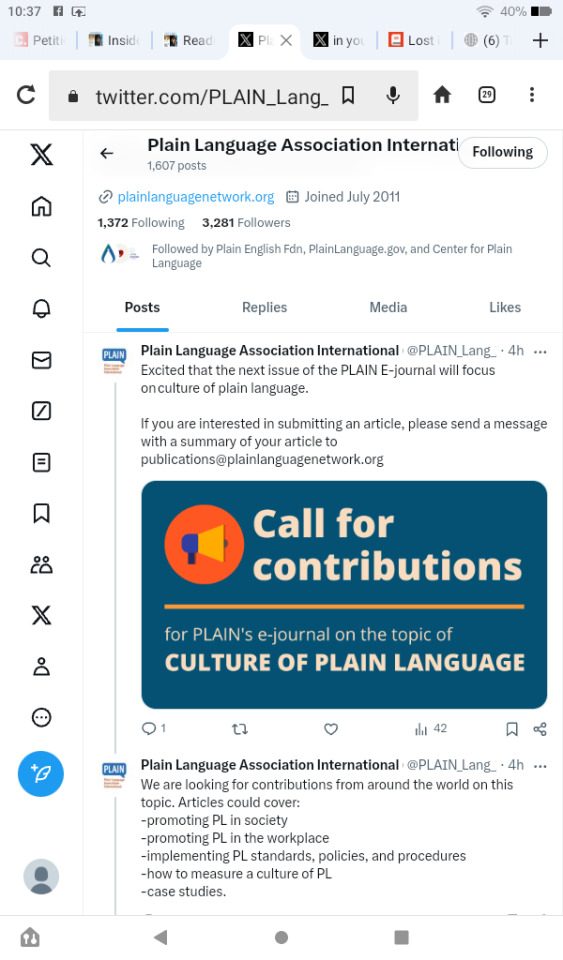
(Link: https://twitter.com/PLAIN_Lang_Intl)
0 notes
Text
own 2 cents about cure autism
autism cure research, generally not coming from point of, those with it wanting to improve life this way. but more so—people around them believe it what they want it what they need it improve life, and, uncured autism seen as … difficult for people around them, expensive for government to provide services, take up resources in medical places, etc.
majority autistic people *in actually autistic community, who understand this topic, & can talk about their opinion* don’t want whole cure
there not-small-group of autistic people who cannot reliably tell you what they think about this, or in way that easily understood (can’t communicate, can’t understand, etc). they need be remembered in this conversation (& arguably centered… bc they gonna be more affected. see below)
having said that. there exist autistic people of all types who would want cure for own autism. out of those have seen myself, majority of them [high support needs / nonverbal or level 2/3 or diagnosed severe or significant symptoms of some sort] whose life extremely different from peers because of it (& like majority of their problem not caused by “society” & won’t disappear if society & capitalism not exist anymore). it how they feel about their own autism, n feel counterproductive in “educating” them about their own (clearly personal and upset) feeling about what they want do with own disorder, especially since they not funding cure research or whatever. but—
autism, developmental disability that start in childhood, famous for be the “be treated as can understand and make own decisions” and “have autonomy respected” and “not ever forced coerced do anything” and “not force abusive therapy to make them appear ‘normal’ ” disorder. (sarcasm) — don’t really believe we as society are at place where we would actually respect “only for people who want it. won’t force it on people who not want it”.
aka. if cure is post-natal, AKA happen after birth… they will directly or indirectly force cure on autistic people
force post-natal autism cure will disproportionately impact those who… higher support needs, diagnosed level 2/3, diagnosed moderate severe, diagnosed low functioning, diagnosed comorbid intellectual disability or global developmental delay, diagnosed comorbid genetic developmental disability, nonverbal… diagnosed children, in conservatorship, ward of state, in prison, generally not fully legally allowed have final say in decision making… visibly autistic, have/said to have severe behavioral issues, BIPOC especially Black people… (incomplete list)
which. not to say autistic people who not any of these won’t be affected at all. because will. but as a whole, people on that list as a collective group, will be more impacted, more coerced, more forced, even won’t be given choice, to take cure (maybe won’t even be told was given cure), over people not on that list as a whole.
am going emphasize that autism is developmental disorder that start in childhood & children get diagnosed with it & children legally not final say in make decision & children very easily talked into agreeing without full informed decision & those diagnosed as children more likely be [higher support needs / nonverbal / more significant symptoms] (EDIT: at time of diagnosis) because those most noticeable earliest + global developmental delay then catch up later on happens (to vastly simply it to a fault, quoting someone, “no shit they high support needs, they children.”)
can also see welfare slowly not covering uncured autistic people, insurance decrease / deny / make harder coverage for autism related services other than cure, schools & esp special education less support for autism, etc. general official resources for autism decreasing (which. not much to begin with even pre-cure), which again impact all autistic people but especially list above… oh and poor people. can also see stuck in limbo of “will not get support & welfare if uncured autistic, but no money to cure” because this shit will be expensive
when this much at stake (aka if there no resource for keep be autistic, n resources locked away only able get after cure), when big percentage of autistic people cannot reliably show informed consent in some way (cannot reliably communicate, cannot reliably show they understand, or literally not allowed have decision capacity legally, etc)… if an autistic person say yes they agree. actual willing yes? not coerced? not misled? not forced into it?
autism & autistic people (& by extension, care people they depend on) don’t have enough support to begin with. in this current reality without cure lol. can we focus on that too pour as much money in that too — let’s not talk autism’s inherent quality of life until you give all autistic people as much care as they need & for it be freely n easily available
don’t really think current science have enough tech & resource cure autism like this. autism is complex disorder with complex sources & hard to say if current what called “autism” based on behaviors & internal reported symptom not actually group of different disorders.
if cure pre-natal (e.g genetic identification & abortion. anti choice unkindly DNI) - see: down syndrome
however: finding genetic cause =/= cure. find genetic cause can easily lead to find cure research. but should be clear that they not equal to eachother, not automatic mean eachother.
um. missing many things probably
TL;DR. don’t think right now society at place where… have widespread enough, nuanced enough, critical enough, & enough awareness/acceptance/understanding of ALL autism (and disability as a whole).
enough support for autistic people for autism-related needs & general needs (financial, food, etc).
world where autistic people who can make own decisions about self actual able make own decision about self, & world where autistic people who genuinely can’t (for now or ever) actually protected from harm
and honestly don’t think we have enough scientific and medical advancement/knowledge/ability
etc
to actually make sure this won’t go haywire
.
idk if anyone can follow this
autism issue is disability justice is cross-movement justice. autism issue depends on liberation of so many groups of people (like welfare reform, prison reform) 👍
follow up
#absolute NOT plain language god idk how do that#complex language#actually autistic#actuallyautistic#autism#autistic#loaf screm#long post#autism cure conversation
476 notes
·
View notes
Text
One of the funny things about Rex and Omega being in the Rebellion at the same time is that they could have any number of conversations that basically are this:
Omega: *does something impressive and chaotic to help people and to fight against the Empire*
Rex: *deliberate breathing as he’s watching her do this, knowing he’s the only person who knows how she got those skills (and from whom)*
Omega: *gets hurt or does something that has the absolute slightest chance of giving Hunter (aka Stressed Protective Dad) heart palpitations if or when he finds out*
Rex: *sighs* Okay, on a scale from “Crosshair’s Pabu Meditations” to “Escape From Tantiss 2: Zillo Beast Electric Boogaloo,” how much lying am I going to have to do to keep your brother from needing medical attention and/or coming out here to read us both the Riot Act?
Omega: Do you want the sanitary version, the Echo version, or the Bad Batch version of the truth?
Rex: I’m getting too old for this.
Rex: *proceeds to cover for Omega anyway when Hunter asks because she’s his sister and they bonded over Blond Shenanigans a while back*
Omega: Thanks, Rex! (I’ll tell you the real story after you talk to Hunter.)
#you can’t tell me these two don’t get into shenanigans while in the Rebellion#who else is going to revive truly bonkers plans to mess with the Empire?#plus Rex is the only one who can translate Omega’s ridiculous ideas into plain language for non-GAR clones#star wars#the bad batch#the clone wars#the rebellion#captain rex#tbb omega#tbb hunter
686 notes
·
View notes
Text
Difference between infantalising disabled people (treating them like children in a bad way) and recognising realistic support needs and limitations.
Some disabled people do need carers to hand feed them. Some disabled people need be told 'hold hand when crossing road' (or always in public). Some disabled people need other people to help with toileting, including changing incontinence aids.
Just because these things that children often need also, doesn't mean disabled adults who need aren't still adults. Not matter if because physical disability or intellectual disability or both.
#hope explain well#last post made think#disability#disabled#infantalisation#infantilization#not spoons to change language#if other person write plain language version very very thanks
196 notes
·
View notes
Text
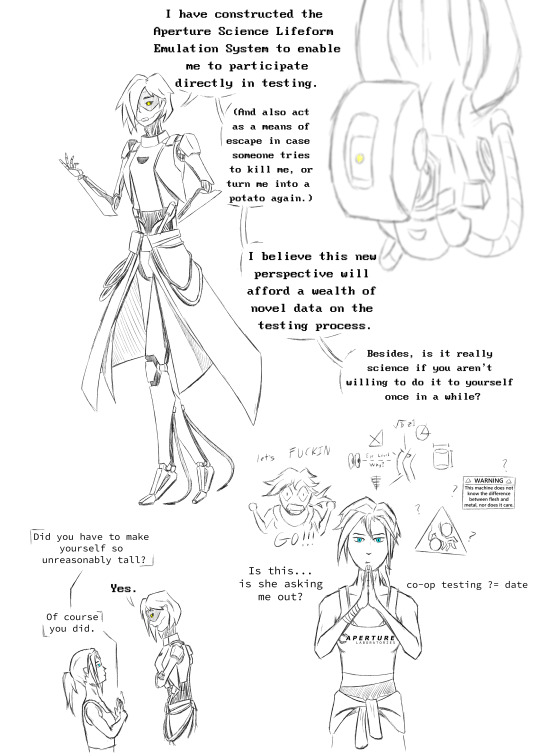
As chosen by my beloved followers: ChellDOS
GLaDOS decides to get more personally involved in the testing. For purely rational Science Reasons. And maybe some security reasons. And no other reasons whatsoever. None. At all.
Chell is intrigued. And also deeply concerned. But mostly intrigued.
Like what I do? Consider supporting me in doing more of it via my ko-fi or patreon!
Close-ups under the cut (click for better viewing):
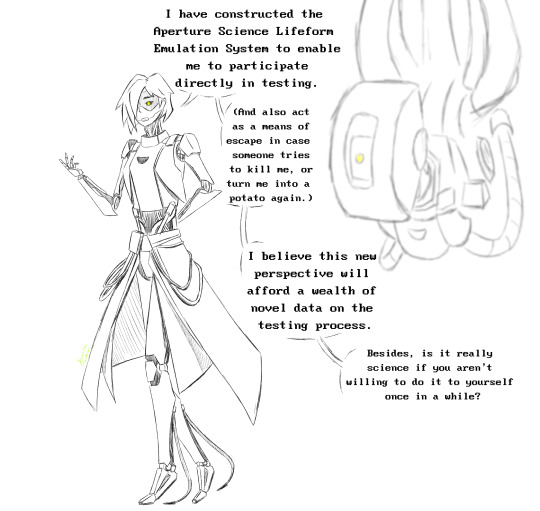
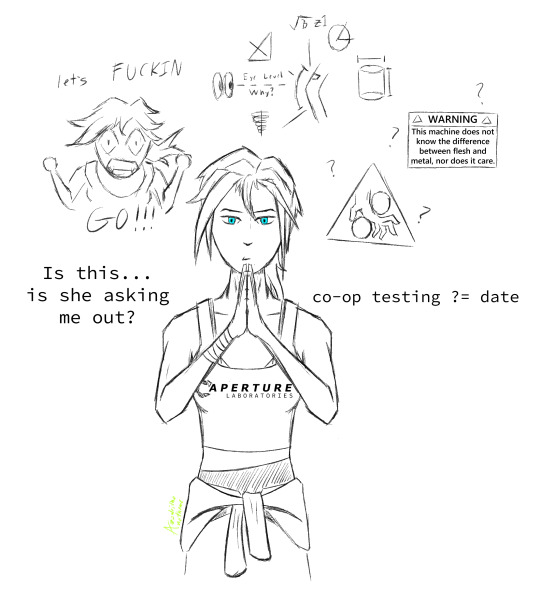
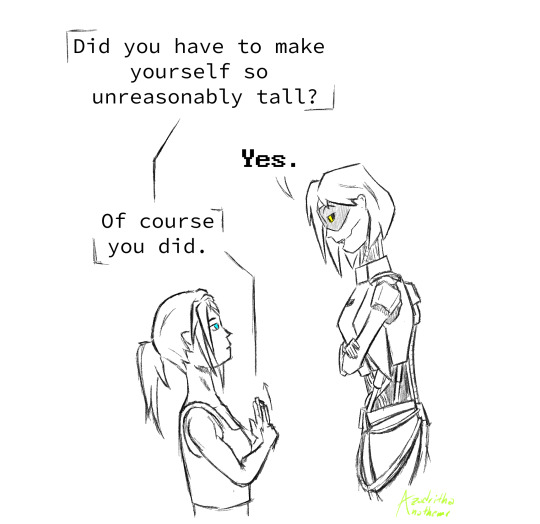
#tried to strike a balance between “mostly human android” and “fully Aperture robot” with my android glados design#not sure if I pulled off exactly what I was going for but I still like what I came up with#it took me forever to get a version of chell that didn't look like hot garbage#(I think the secret was in the eyes)#I really need to work on drawing humans#sorry to anyone who knows asl if chell's signing is off or just plain incorrect in the last drawing#I regrettably do not know sign language and thus have to trust the tenuously reliable powers of internet search results#portal#portal 2#portal fanart#chell portal#glados#genetic lifeform and disc operating system#android glados#chelldos#chell x glados#lesbian#aza doodles#digital art#artists on tumblr
88 notes
·
View notes
Text
What Do We Mean by Normal and Pathological Dissociation?
Dissociation is when someone feels separated from their thoughts, feelings, or memories. Sometimes, dissociation is considered a normal reaction to certain situations. Other times, it can be seen as a pathological (or harmful) condition. Although the difference between normal and pathological dissociation is talked about in many research papers, it often isn't clearly explained on its own. As different experts write about it, they use different ways (or “dimensions”) to separate what they call “normal” dissociation from what they call “pathological” dissociation. The following sections highlight some key dimensions that people use to make sense of these two forms of dissociation.
1. Type
Some experts theorize that certain “types” of dissociation are normal, while others are not. For example, research suggests that amnesia (forgetting important parts of an experience), depersonalization (feeling disconnected from oneself), and identity problems (like in DID) are a part of pathological dissociation. In contrast, absorption (losing yourself in a good book or movie) is often seen as normal.
Some researchers also talk about a “dissociative taxon.” A taxon, in this specific context, is a special group of people who show a certain kind of dissociation. (Note that in a broader sense, 'taxon' can refer to any category used for classification, but here it specifically focuses on dissociative features.) If you have this taxon, you might have a dissociative “disorder.” If you do not, you are probably not at risk. In this view, “normal dissociation” is any kind that does not lead to clear mental health problems.
2. Level
Other scientists view dissociation as existing on a continuum (a line that goes from low to high). At one end are mild forms of dissociation, such as absorption. At the other end is structural dissociation, such as DID, which is much more severe. In this way of thinking, what makes dissociation “pathological” is how intense or extreme it is.
3. Timing
In recent years, people have started talking about the terms peritraumatic and posttraumatic in the context of dissociation.
Peritraumatic dissociation is dissociation that happens during or right after a traumatic event. This may be a normal and helpful response at the time, but it can also make someone more likely to develop PTSD.
Posttraumatic dissociation happens after a trauma, sometimes lasting long after the event.
For example, it can be normal to
feel “out of body” right after or during a scary event
have a short time when you notice less pain during a crisis
or experience a kind of “shock” that can make you feel confused or disoriented and cause gaps in your memory right after very distressing news
However, if these experiences continue when there is no current threat, it may become pathological. According to Lisa Butler, dissociative disorders are not considered disorders just because dissociation happens or because it helped someone survive trauma. Instead, they become disorders when severe dissociation and its harmful effects continue long after the traumatic situation is over.
4. Relationship to Defense
Some researchers say that normal dissociation happens when we put all our attention on one thing and block out everything else. For instance, if you are absorbed in a video game and do not hear someone calling your name, that is a normal kind of dissociation.
In pathological dissociation, the blocked memories or feelings might be clearly recorded in the brain but are pushed away on purpose, almost like a defense mechanism. This can cause problems later because these memories and feelings may come back in distressing ways.
5. Frequency
Sometimes people call dissociation “normal” if it happens often in the general population. For example, items that measure absorption on a test (such as the Dissociative Experiences Scale) are common. On the other hand, items that measure amnesia or depersonalization happen less often. Because absorption is more frequent, it is often seen as normal.
6. Purpose
The last way to tell apart normal and pathological dissociation is to look at its purpose. For example, imagine a soldier who ignores the pain of a combat wound just long enough to get to safety. This dissociation helps the soldier survive, so it might be called “normal.” But if the same numbness or lack of awareness shows up in a safer situation (like someone who harms themself because they don't notice their own pain) that might be a “pathological” use of dissociation.
Evolutionary ideas suggest that dissociation can help us:
Protect ourselves by separating out terrible experiences,
Save energy by focusing only on what is necessary, or
Avoid conflict by pushing away thoughts and feelings we cannot face.
When dissociation is used for a helpful reason and does not harm us, it is seen as normal. However, if it is used in an unhealthy way or lasts too long, it can become pathological.
This post has been adapted from Constance J. Dalenberg, PhD, and Kelsey Paulson, BS, in their chapter “The Case for the Study of ‘Normal’ Dissociation Processes,” found on page 147 of Paul F. Dell and John A. O’Neil’s edited book, Dissociation and the Dissociative Disorders: DSM-V and Beyond.
#poasts#this post is primarily me excercising my plain language muscle i need a lot for work#DID/OSDD#also i am so sorry i got exhuasted trying to get all the corss referenced references halfway thru but#they are in the original entry if you want to have a looky loo#wtf is wrong with me why i say looky loo
59 notes
·
View notes
Text
I've said this before but the interesting thing about AI in science fiction is that it was often a theme that humanity would invent "androids", as in human-like robots, but for them to get intelligent and be able to carry conversations with us about deep topics they would need amazing advances that might be impossible. Asimov is the example here though he played a lot with this concept.
We kind of forgot that just ten years ago, inventing an AI that could talk fluently with a human was considered one of those intractable problems that we would take centuries to solve. In a few years not only we got that, but we got AI able to generate code, write human-like speech, and imitate fictional characters. I'm surprised at how banal some people arguing about AI are about this, this is, by all means, an amazing achievement.
Of course these aren't really intelligent, they are just complex algorithms that provide the most likely results to their request based on their training. There also isn't a centralized intelligence thinking this, it's all distributed. There is no real thinking here, of course.
Does this make it less of a powerful tool, though? We have computers that can interpret human language and output things on demand to it. This is, objectively, amazing. The problem is that they are made by a capitalist system and culture that is trying to use them for a pointless economic bubble. The reason why ChatGPT acts like the world's most eager costumer service is because they coded it for that purpose, the reason why most image generators create crap is because they made them for advertising. But those are not the only possibilities for AI, even this model of non-thinking AIs.
The AI bubble will come and pop, it can't sustain itself. The shitty corporate models will never amount to much because they're basically toys. I'm excited for what comes after, when researchers, artists, and others finally get models that aren't corporate shit tailored to be costumer service, but built for other purposes. I'm excited to see what happens when this research starts to create algorithms that might actually be alive in any sense, and maybe the lines might not exist. I'm also worried too.
#cosas mias#I hate silicon valley types who are like 'WITH AI WE WILL BE ABLE TO FIRE ALL WORKERS AND HAVE 362% ANNUAL GROWTH#but I also hate the neo luddites that say WHY ARE YOU MAKING THIS THERE IS NO USE FOR THIS#If you can't imagine what a computer that does what you ask in plain language could potentially do#maybe you're the one lacking imagination not the technobros
90 notes
·
View notes
Text



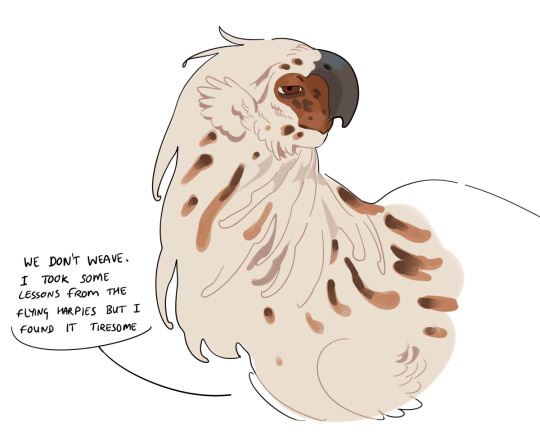
harpies speak from their syrinx which is in their chests.
Cuinn got basic lessons as a kid like everyone else but was not able to continue learning and developing his skills once he was taken as a tiercel. He's trying to relearn it now using some weaving frames designed for humans which make things a little easier than the freehand/frameless style from his home eyrie.
Thunder Strike is pretty good but he's so focused on the end product that it's all he can think about when he gets to work. As a king he doesn't have a lot of free time to work on it though.
Terrestrial harpies don't have a weaving instinct but obviously they can still learn it as a skill, Wildfire just didn't care for it. He prefers to play with dyes and paints. The people of his eyrie produce dyed grass threads which the others can weave with.
#i legit know nothing about weaving so the frame uhhh just call it artistic licence#ice storm over kosa#these three all come from the Ama plains and speak the same language (tho Wildfire comes is from centuries earlier)#it's a really stilted type of speech. and kings are always expected to speak in absolutes#idk if this was for the in-character ama but i really just wanted an excuse to draw all three of them so
164 notes
·
View notes